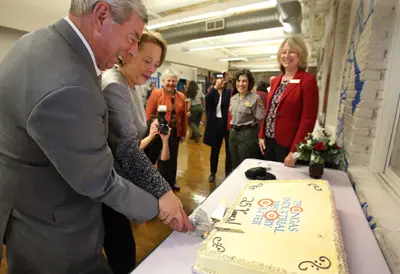'Browsing Through Birke’s' Speaks to Genocide Trauma
 Image by Katharine Webster
Image by Katharine Webster
11/03/2016
By Katharine Webster
History isn’t a dead discipline found in dusty books: It lives every day in the people around us.
That’s what history majors Autumn Sacramone ’17 and Suzanne St. Peters ’16 discovered when they decided to go beyond the classroom and become practicing historians.
They created a study guide for the Tsongas Industrial History Center to accompany the 1996 documentary “Browsing Through Birke’s,” which portrays two Holocaust survivors, Nathan and Sally Birke, and their business in downtown Lowell, Birke’s Department Store.
“Projects like this where you get personal, intimate information help students connect with the material more,” Sacramone says. “It humanizes history for them. It seems like it’s such a cold subject, but it’s really not.”
Sacramone hated history in high school because it mostly involved memorization. She and St. Peters wanted to show today’s high school students, especially in Lowell, how history affects them and their classmates, many of whose families survived similar traumas, including the Cambodian genocide and wars in Africa.
“We’re an immigrant city. We felt like it was important and timely to teach the next generation that everyone has a story, everyone has a family and it’s not always roses,” St. Peters says.
“Maybe we can help students understand each other more,” Sacramone adds.
The web-based study guide includes historical photos, information about the film and the filmmaker, written historiographies and oral histories of survivors of the Holocaust and the Cambodian and Armenian genocides, questions for discussion, suggestions for teachers and links to other educational resources.
 Image by Katharine Webster
Image by Katharine Webster
A teacher at Lowell High School is using the guide in an honors social studies class about Lowell. The Lowell National Historical Park will host a screening of the film on April 25, with a panel discussion involving local immigrants.
Nathan Birke had a reputation as a curmudgeon who would throw people out of his store for browsing (a large sign, prominently displayed, said “No Browsing: Ask for Assistant”). He tossed other people for being too picky. He also lectured customers on the horrors of the Holocaust and displayed articles and photos about it on the store’s walls.
Sally Birke, on the other hand, greeted customers with homemade treats, coffee and tea. She appears in the documentary, as does the Birkes’ daughter, Szifra, a therapist and consultant who talks about what it was like growing up with parents who’d suffered so much. She also helped Sacramone and St. Peters with their study guide.
“The trauma doesn’t go away. Decade after decade, the experience is still raw inside,” St. Peters says. “And the more we dug into it, the more we realized the traumatic effect for the second and third generations.”
A Working Partnership
St. Peters and Sacramone created the guide at the suggestion of Sheila Kirschbaum, director of the Tsongas Industrial History Center, an education partnership between the university’s Graduate School of Education and the Lowell National Historical Park.
Kirschbaum says that growing up in Chelmsford, she knew of Birke’s and its quirky reputation. The documentary by Steven Grossman, which includes footage of the Holocaust, helped her connect the dots between Nathan Birke’s demeanor and the trauma of war. She says St. Peters and Sacramone quickly understood her passion for the movie.
“I was hugely impressed by their understanding of what was important about this film, their empathy and their diligence,” she says. “And it wasn’t just an assignment; it was life-changing.”
Both women say the project was the best experience of their college careers.
St. Peters, a Lowell native who worked her way through Middlesex Community College and UMass Lowell as a certified nursing assistant, often taking care of veterans, says the Birke’s project inspired her to visit the Vietnam War Memorial in Washington, D.C., this past summer and start research for a book on the 21 Lowell men who died in action.
“I will always be a historian,” she says. “For me, it’s important to find the unknown people who haven’t made it into the history books, people who have made a difference, so that they will never be forgotten.”
Sacramone, an education minor from Westford who intends to start the fast-track program for a master’s in education this spring, plans to teach high school history. She says she was inspired by many of the people they interviewed, especially the genocide survivors.
“The people who’d been through the most, all they wanted to do was give back by volunteering or creating organizations to help others,” she says.




